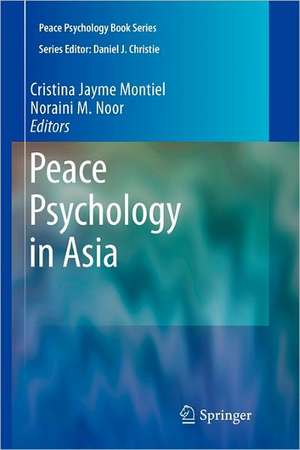Peace Psychology in Asia: Peace Psychology Book Series
Editat de Cristina Jayme Montiel, Noraini M. Nooren Limba Engleză Paperback – 6 dec 2010
Using examples from China, India, Indonesia, the Philippines, and elsewhere in the region, chapter authors illuminate the complex social, political, and religious conditions that have fostered war, colonialism, dictatorships, and ethnic strife, and the equally intricate personal and collective psychologies that need to be developed to encourage reconciliation, forgiveness, justice, and community. Peace Psychology in Asia:
- Integrates psychology, history, political science, and local culture into concepts of peace and reconciliation.
- Highlights the indigenous aspects of peace psychology.
- Explains the critical relevance of local culture and history in peace work.
- Blends innovative theoretical material with empirical evidence supporting peace interventions.
- Balances its coverage among local, national, regional, and global contexts.
- Analyzes the potential of Asia as a model for world peace.
| Toate formatele și edițiile | Preț | Express |
|---|---|---|
| Paperback (1) | 1595.75 lei 6-8 săpt. | |
| Springer – 6 dec 2010 | 1595.75 lei 6-8 săpt. | |
| Hardback (1) | 1226.11 lei 6-8 săpt. | |
| Springer – 11 iun 2009 | 1226.11 lei 6-8 săpt. |
Din seria Peace Psychology Book Series
- 18%
 Preț: 779.26 lei
Preț: 779.26 lei -
 Preț: 361.07 lei
Preț: 361.07 lei - 15%
 Preț: 639.25 lei
Preț: 639.25 lei - 18%
 Preț: 788.54 lei
Preț: 788.54 lei - 15%
 Preț: 699.28 lei
Preț: 699.28 lei - 15%
 Preț: 646.62 lei
Preț: 646.62 lei - 18%
 Preț: 1690.13 lei
Preț: 1690.13 lei - 15%
 Preț: 645.28 lei
Preț: 645.28 lei - 24%
 Preț: 1044.87 lei
Preț: 1044.87 lei - 18%
 Preț: 945.14 lei
Preț: 945.14 lei - 15%
 Preț: 649.54 lei
Preț: 649.54 lei -
 Preț: 386.39 lei
Preț: 386.39 lei - 15%
 Preț: 697.82 lei
Preț: 697.82 lei - 15%
 Preț: 591.14 lei
Preț: 591.14 lei - 18%
 Preț: 1222.94 lei
Preț: 1222.94 lei - 15%
 Preț: 644.82 lei
Preț: 644.82 lei - 15%
 Preț: 649.22 lei
Preț: 649.22 lei - 15%
 Preț: 697.65 lei
Preț: 697.65 lei -
 Preț: 388.72 lei
Preț: 388.72 lei - 15%
 Preț: 647.08 lei
Preț: 647.08 lei - 24%
 Preț: 967.03 lei
Preț: 967.03 lei - 15%
 Preț: 638.89 lei
Preț: 638.89 lei - 15%
 Preț: 650.37 lei
Preț: 650.37 lei - 18%
 Preț: 733.15 lei
Preț: 733.15 lei -
 Preț: 398.74 lei
Preț: 398.74 lei - 15%
 Preț: 644.30 lei
Preț: 644.30 lei - 18%
 Preț: 1116.57 lei
Preț: 1116.57 lei -
 Preț: 365.05 lei
Preț: 365.05 lei - 15%
 Preț: 643.99 lei
Preț: 643.99 lei - 18%
 Preț: 1116.26 lei
Preț: 1116.26 lei - 18%
 Preț: 1381.26 lei
Preț: 1381.26 lei - 18%
 Preț: 779.89 lei
Preț: 779.89 lei
Preț: 1595.75 lei
Preț vechi: 1946.03 lei
-18% Nou
Puncte Express: 2394
Preț estimativ în valută:
305.38€ • 331.60$ • 256.52£
305.38€ • 331.60$ • 256.52£
Carte tipărită la comandă
Livrare economică 22 aprilie-06 mai
Preluare comenzi: 021 569.72.76
Specificații
ISBN-13: 9781441931986
ISBN-10: 1441931988
Pagini: 364
Ilustrații: XVI, 337 p. 24 illus.
Dimensiuni: 155 x 235 x 19 mm
Greutate: 0.51 kg
Ediția:Softcover reprint of hardcover 1st ed. 2009
Editura: Springer
Colecția Springer
Seria Peace Psychology Book Series
Locul publicării:New York, NY, United States
ISBN-10: 1441931988
Pagini: 364
Ilustrații: XVI, 337 p. 24 illus.
Dimensiuni: 155 x 235 x 19 mm
Greutate: 0.51 kg
Ediția:Softcover reprint of hardcover 1st ed. 2009
Editura: Springer
Colecția Springer
Seria Peace Psychology Book Series
Locul publicării:New York, NY, United States
Public țintă
Professional/practitionerCuprins
to Peace Psychology in Asia.- Overview of Peace Psychology in Asia: Research, Practice, and Teaching.- Culture, Social Representations, and Peacemaking: A Symbolic Theory of History and Identity.- South Asia.- Where Are We Going? Perspective on Hindu–Muslim Relations in India.- Political Violence and Peacebuilding in Jammu and Kashmir.- Southeast Asia.- Peace Psychology of Grassroots Reconciliation: Lessons Learned from the “Baku Bae” Peace Movement.- Memory for Sale: How Groups “Distort” Their Collective Memory for Reconciliation Purposes and Building Peace.- Contested Discourses on Violence, Social Justice, and Peacebuilding Among Indonesian Muslims.- Interreligious Harmony and Peacebuilding in Indonesian Islamic Education.- The Future of Malay–Chinese Relations in Malaysia.- A Positioning Analysis of Moro Women’s Participation During and After the MNLF–GRP War.- Human-Technology Interface in Philippine People Power.- East Asia.- Forgiveness for Conflict Resolution in Asia: Its Compatibility with Justice and Social Control.- Toward Reconciliation of Historical Conflict Between Japan and China: Design Science for Peace in Asia.- Is the Third Way Possible for Peace? The Dilemma of National Identity in Taiwan and Beyond.- Income Gap, Materialism, and Attitude toward the Rich in Developing Countries.- Future of Peace Psychology in Asia.- How Asia Can Contribute to World Peace Psychology: Creating a Dignified and Peaceful World by Employing Unity in Diversity.- The Future of Peace Psychology in Asia.
Textul de pe ultima copertă
In recent years, peace psychology has grown from a utopian idea to a means of transforming societies worldwide. Yet at the same time peacebuilding enjoys global appeal, the diversity of nations and regions demands interventions reflecting local cultures and realities. Peace Psychology in Asia shows this process in action, emphasizing concepts and methods diverging from those common to the US and Europe.
Using examples from China, India, Indonesia, the Philippines, and elsewhere in the region, chapter authors illuminate the complex social, political, and religious conditions that have fostered war, colonialism, dictatorships, and ethnic strife, and the equally intricate personal and collective psychologies that need to be developed to encourage reconciliation, forgiveness, justice, and community. Peace Psychology in Asia:
Using examples from China, India, Indonesia, the Philippines, and elsewhere in the region, chapter authors illuminate the complex social, political, and religious conditions that have fostered war, colonialism, dictatorships, and ethnic strife, and the equally intricate personal and collective psychologies that need to be developed to encourage reconciliation, forgiveness, justice, and community. Peace Psychology in Asia:
- Integrates psychology, history, political science, and local culture into concepts of peace and reconciliation.
- Highlights the indigenous aspects of peace psychology.
- Explains the critical relevance of local culture and history in peace work.
- Blends innovative theoretical material with empirical evidence supporting peace interventions.
- Balances its coverage among local, national, regional, and global contexts.
- Analyzes the potential of Asia as a model for world peace.
Caracteristici
Combines the various levels of analysis, integrating political science, social movements, culture and intergroup relationships Highlights the indigenous nature of a psychology of peace Asian contributors will be highlighting their local issues, using local knowledge and culture in understanding and mediating issues Offers empirical evidence of peace interventions in addition to presenting theoretical innovations about a psychology of peace Includes supplementary material: sn.pub/extras









